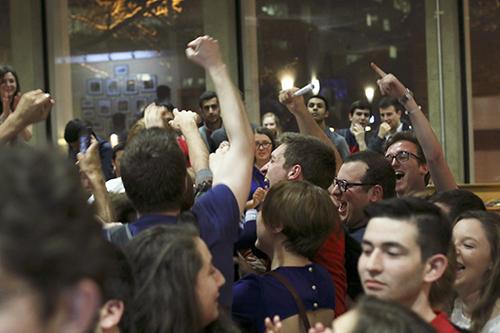
Justin Peligri, a senior majoring in political communication, is a Hatchet senior columnist.
“There’s nothing to see in there,” I said to a student headed into the Marvin Center. I was on my way out after the Student Association election results were announced last night. “Everyone’s clearing out.”
“Oh, I know,” the student icily replied. “I missed it on purpose.”
That student isn’t alone in his sentiment: In my experience, the most dominant narrative about student elections at GW is that they don’t matter. Even the candidates themselves – as we saw at Tuesday night’s debate – talk about how “it’s just student government” in between attempts to trumpet tenets of their platforms.
Granted, our elections at GW are deeply flawed. They devolve into popularity contests, employ reductive hashtags and rely on a mobilized Greek vote as one of the few viable paths to victory. But it isn’t smart to let our myriad valid criticisms distract us from what’s important.
Like them or hate them, there’s tremendous value in student elections.
The point of college is to learn – it’s to practice, make mistakes, spend these four years doing everything we possibly can to prepare ourselves for the world outside Foggy Bottom’s insulated confines. Part of this learning happens in classrooms, of course. But the most substantial part of it occurs through our extracurriculars.
My biggest learning experiences at college came from joining The Hatchet. I learned how to write a halfway decent column, I think – but I also learned how to lead a staff of writers, solve conflicts and balance commitments. I hope these skills will help me become a more well-rounded job applicant and individual.
Student advocacy, like any other organized group on campus, is just one more way to learn. No, it’s not the real world, but it’s pretty damn good preparation for it. Student government as an institution isn’t perfect, and neither are most candidates – I think it’s safe to say, for example, that we all could use a dose of humility.
But by shooting down the entire process and insisting it doesn’t matter, we’re denying those students the opportunity to practice what it’s like to hold office.
(Full disclosure: As some readers may know, I’m dating a soon-to-be former student government leader.)
At its best, too, student government mobilizes a campus to action. It advocates for solutions to issues that affect every one of us – like sexual violence, mental health and housing.
We saw what happens when students care: Two ballot initiatives were passed Thursday, one calling for sexual violence awareness training at Colonial Inauguration, and one demanding that GW disclose its investments in fossil fuel corporations and sever those financial ties. Because of student advocacy, University President Steven Knapp will have two student-backed demands on his desk.
We’re all human – and not all student government leaders have left a substantial impact. But to be painfully honest, student government is our only hope. Administrators on this campus listen to SA leaders. Often, that’s the only voice they listen to, which is why we should get involved – as candidates or even just informed onlookers – instead of lazily pontificating on Facebook about the University’s flaws.
A record number of students voted in this year’s student elections. But 5,456 votes represents only slightly more than a fifth of total undergraduate and graduate students. That’s still a pitiful total.
If student government isn’t your thing, than don’t mount a campaign. But don’t cast aside an entire process before you take a moment to think about its true benefits.




